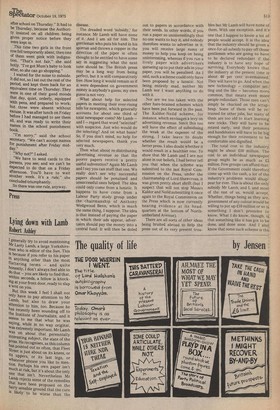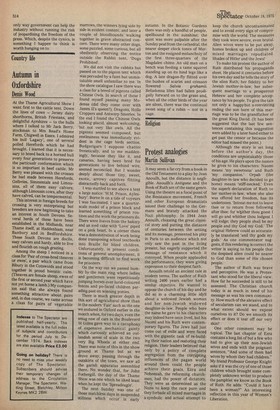Press
Lying down with Lamb
Robert Ashley
I generally try to avoid mentioning Mr .Larry Lamb, a large Yorkshireman who is editor of the Sun. This Is because if you refer to his paper
in anything other than the most flattering terms — and quite honestly, I don't always feel able to do that — you are likely to find that, Within seconds, a fellow is knocking at your front door, ready to slap a writ on you.
But this week I feel I shall not only have to pay attention to Mr Lamb, but also to draw your attention to him, too. Because he has recently been sounding off to the Institute of Journalists, and it seems to me that what he was saying, while in no way original, was extremely important. Mr Lamb was on about that perennially interesting subject, the state of the Press. He recognises, as this column has pointed out so often, that Fleet Street is just about on its knees, or its uppers, or its last legs, or Whatever phrase you like to mention. Perhaps his own paper isn't much at risk, but it's about the only one that isn't. Nevertheless Mr Lamb rejects some of the remedies that have been proposed on the fairly sensible ground that the cure is likely to be worse than the
disease.
The dreaded word 'subsidy,' for instance. Mr Lamb will have none of it. And I am all for him. The gentleman who puts his hand in his sporran and throws a copper in the direction of the piper is often thought to be entitled to have some say in suggesting what the next tune should be. The British press may be a long way from being perfect, but it is still comparatively free. How long it would remain so if it were dependent on government money is anybody's guess; my own guess is not very.
What about help for selected papers in meeting their ever-rising bills for newsprint, which generally accounts for about one third of total newspaper costs? Mr Lamb — and I — regard that word "selected" with suspicion. Just who would do the selecting? And on what basis? So, if you don't mind, no help for selected newspapers, thank you very much.
Then what about re-distributing advertising revenue so that the poorer papers receive a pretty useful subvention? Again Mr Lamb and I say you can stuff that one. We really don't see why successful papers should be penalised and unsuccessful ones helped. The idea could only come from a lunatic. It happens to have come from a Labour Party study group under the chairmanship of Anthony Wedgwood Benn, which is much the same thing, I suppose. The idea is that instead of paying the paper in which their ads appear, advertisers should pay the money into a central fund. It will then be doled out to papers in accordance with their needs. In other words, if you run a paper so uninterestingly that no one wants to buy it, and nobody therefore wants to advertise in it, you will receive large sums of money to help you keep on being uninteresting, whereas if you run a lively paper with advertisers queueing up to put their ads in your paper, you will be penalised. As I said, such a scheme could only have been proposed by a lunatic. Not being entirely mad, neither Mr Lamb nor I want anything to do with it.
Nor are we too taken with the other hare-brained schemes which have been put forward in the past. The Kaldor-Neild scheme, for instance, which envisages a levy on advertising revenue. Since this too will have the effect of subsidising the weak at the expense of the strong, I take leave to doubt • whether the result would be a better press. I also doubt whether it would result in a healthier one. To show that Mr Lamb and I are not alone in our beliefs, I had better tell you that when the scheme was submitted to the last Royal Commission on the Press, under the chairmanship of Lord Shavvcross, it • was given pretty short shrift (but I suspect that will not stop Messrs Kaldor and Neild submitting it once again to the Royal Commission on the Press which is now currently hearing evidence at its headquarters at the bottom of Northumberland Avenue).
There are all sorts of other ideas being bruited abroad to help the press out of its very present trou
bles but Mr Lamb will have none of them. With one exception, and it's
one that I happen to know a lot of people would accept. It is the idea that the industry should be given a once-for-all subsidy to pay off those gentlemen who are going to have to be declared redundant if the industry is to have any hope of surviving. Everybody knows that the industry at the present time is about 40 per cent overmanned. They will have to go. And when the new technology — computer setting and the like — becomes more common, that means even more people redundant. Those men can't simply be chucked on the scrapheap. Some of them will be retrained for other jobs, but many of them are too old to .tart learning new tricks. They will have to be retired early, and their pensions and handshakes will have to be big enough for their retirement to be comfortable and dignified.
The total cost to the industry might be about £10 million. The cost to an individual newspaper group might be as much as £2 million. Few groups can afford that. If the Government could therefore come up with the cash, a lot of the industry's problems would disappear for ever. This is about the only subsidy Mr Lamb, and I, and most of the rest of us, would accept.
Whether, things being as they are, government of any colour would be willing to put up £10 million or so is something I don't presume to know. What I do know, though, is that something like it has got to be
done, and done soon. And I also know that some such scheme is the
only way government can help the industry without running the risk of jeopardising the freedom of the press. Which, despite the cynics, is something I happen to think is worth hanging on to.



































 Previous page
Previous page